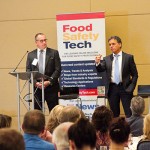It’s a given that the entire continuum of businesses providing food to the public must have an unwavering commitment to making certain that food is safe and wholesome. The linchpin of ensuring food safety is front-line employees, whether they work for a corner grocery store, restaurant or multi-state food wholesaler. Making sure these employees have the knowledge and credentials they need to keep the public safe is the responsibility of the employer, and that responsibility is too critical to be taken lightly, as incidences of foodborne illness can have a significant impact on a company’s reputation and profitability.
How can an employer ensure that its workers have the food safety skills they need? They can provide rigorous and continual skills assessments. Rigor is needed because food safety is a complex issue, and continual testing is important because local, state and federal regulations are modified and updated on a consistent basis.
The first step in making sure employees are equipped for their jobs is to partner with a food safety assessment provider devoted to quality and integrity throughout the examination development and delivery process.
To be certain exams are of the highest quality, a company should begin by asking a prospective assessment provider this question: Do you work with subject matter experts (SMEs) from the food safety industry to develop your exams? Discussions should continue only when it is confirmed that SMEs are heavily involved in the test development process.
There are several reasons why subject matter experts (SMEs) are critical to this process. Their real-world experience in food safety provides a wealth of knowledge from a variety of viewpoints. And applying that knowledge to developing exams means those exams will accurately assess employees’ ability to conscientiously use good food safety practices on the job. By working with SMEs on a continuing basis, the assessment provider also can make sure that the content of exams can be promptly and effectively updated as regulations and best practices evolve.
The right food safety assessment provider, however, does more than just solicit input from SMEs; it works side by side with them throughout the test creation process: Design, development, construction and analysis. As noted earlier, this collaboration also must be ongoing to make certain that exam questions stay current with advancements and amendments in the food safety regulatory landscape. By continually updating exam questions, exams don’t need to be recreated from “square one,” saving companies time and money, while also protecting the public.
The best food safety testing and assessment providers don’t rely solely on SMEs for expertise. Rather, they develop and refine their own knowledge and insights, and continually monitor and react to both developments in the food industry and changing requirements of the workforce in each industry sector. That way, exams for personnel in any industry segment can be thoroughly based on questions and challenges found on the job each day.
Another critical question for a prospective food safety assessment provider is whether the company’s work is in-line with accepted standards for designing, delivering and evaluating exams. The two most widely-accepted standards are those of the American National Standards Institute (ANSI) and Educational Testing Service (ETS). These organizations’ standards are designed to make sure exams meet precise criteria for measuring a test taker’s performance accurately and fairly.
Like any member of the food service industry, a food safety assessment provider also must maintain sufficient stock to serve the needs of its clients. That is, it must maintain a large inventory of exam questions for each exam it offers. Should questions become fixed, exam integrity could be compromised as test takers would then have the opportunity to share question content. A large inventory of exam questions enables the assessment provider to more precisely tailor questions to specific workplace scenarios.
In addition, just as employers must continuously evaluate on-the-job performance of their workforce, food safety assessment providers also must continually evaluate the performance of the questions on their exams. This evaluation should be performed both as exams are developed and after they are deployed. Such a before-and-after analysis is the only way to verify that an exam will provide an accurate measure of employee knowledge and their ability to apply that knowledge.
So, if you are actively looking for a food safety assessment provider, be sure to ask them the right questions:
- Do you work with SMEs from the food safety industry to develop your exams?
- Are the SMEs involved throughout exam development?
- Do your tests meet widely accepted standards for accuracy and fairness?
- Do you maintain a broad and deep inventory of exam items?
- Are your test items continuously evaluated?
Then, be sure you get the right answers.
Visit www.prometric.com/foodsafety to view a panel discussion from the 2017 Food Safety Consortium on creating the right food safety assessment. Part 2 of this series will include information on developing rigorous, reliable, and relatable items that are tested and continuous.







